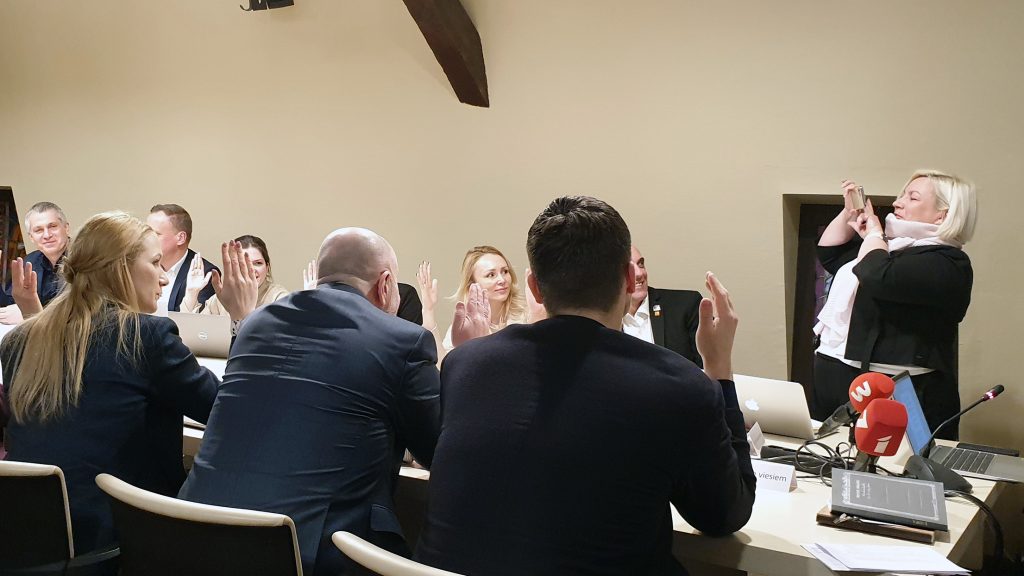Founded in the wake of the 2008 financial crisis, this public e-participation website allows Latvian citizens to propose, submit and sign legislative initiatives to improve government at both national and local level. The first proposals were launched in June 2011 and focused on improving transparency around offshore operations. ManaBalss rapidly gained widespread support and the Latvian parliament, or Saeima, changed legislation in response.
How ManaBalss works
Any Latvian citizen can submit a proposal, once identification has been established via i-banking or the official eSignature, which the parliament double checks in the population register. When a proposal comes in, the team at ManaBalss confer with legal experts and each other before deciding whether to accept the proposal or not. This can be a tough process but is one of the keys to the platform’s success, agree both Melkis and Terauda.
Once a proposal is approved and uploaded onto the platform, it is up to the initiators to promote their idea with the goal of getting 10 000 signatures in support. “If it gets enough signatures, it is guaranteed five minutes of fame in the first level of parliamentary committees” explains Terauda. What happens after that depends on a number of factors but this important first step lies in the hands of the citizens who proposed the idea.
Neutrality is key
Today, a total of 100 proposals have reached a definitive decision in parliament, with 59 of those implemented into law. Some 42 proposals are currently under review. There is no time limit on proposals. So, for example, Melkis explains that they have recently submitted one of the longest running initiatives to the parliament. In fact, in the intervening years, the original initiator has changed his mind about his idea!
The proposal involves a call for popular elections for the President of Latvia. Currently members of the Saeima (parliament) vote for a president. “I am very cautious about this idea” admits Melkis, “but here we go, it’s in the parliament and I’m providing administrative and technical advice.” This example speaks to another key aspect of the platform’s success: neutrality.
This is very important, confirms Melkis, “I would describe it as our ‘business model’” he says. He believes it is one of the reasons why people from across the political spectrum support ManaBalss. The organisation receives around €70 000 annually in the form of voluntary micro-donations from citizens.
Anonymous participation
It is not so easy to achieve neutrality, particularly in a small country like Latvia. For this reason, it is vital to ensure the anonymity of the submitter and the advising experts to achieve greater objectivity, explains Terauda. When a proposal is submitted, the team at ManaBalss assess it using the following criteria: Project proposals must promote the development of an open, democratic and sustainable economy and help foster good governance. Facts and data relating to proposals must be accurate and initiatives must be realistic to implement. They also consult with experts for legal and other feedback. “Sometimes people can get very angry” admits Melkis. Anonymity helps keep things professional rather than personal.
Almost all proposals will be adjusted in some way before being published on the platform. Some of the more sensitive proposals require a lot of dialogue between the initiator, the experts and ManaBalss. The organisation benefits from a wide variety of experts who provide their services pro bono. Taken together, this approach has helped foster what Melkis terms “an ecosystem of trust” over the years. He believes it plays a key role in the innovation in governance that a platform like this one represents.
Terauda agrees that the ability to filter proposals in a way that doesn’t thwart public participation while ensuring their quality is central to the platform’s success.
The importance of parliamentary involvement
She also highlights the platform’s focus on getting directly involved with parliamentary procedures as pivotal to its ongoing popularity. Terauda worked with the Centre for Public Policy PROVIDUS when they helped ManaBalss get started. She recalls how the determination to “insert itself, as an NGO, into official parliamentary procedure was a long and not so easy procedure”. Yet they succeeded.
“Any citizen who has something to bring forward – ManaBalss is the first tool they think about.” Terauda believes that discussion at parliamentary level, rather than forced decisions, sometimes about contentious issues, is another reason for its success.
For example, Latvia’s LGBTQ community has started numerous initiatives that have resulted in the issue at hand gaining increased exposure at parliamentary level. They have now successfully promoted civil partnership legislation which is currently under discussion.
Driving changes – big and small
Terauda points to the phasing out of the fur industry in Latvia by 2028 as another example of success. This was an issue most politicians simply didn’t want to go near, she explains, because of long established industry lobbying and ingrained attitudes toward the issue.
However, a proposal coming directly from the citizens is difficult to ignore and forces those involved to reconsider long-held stereotypes. For smaller, less contentious issues, the existence of a citizens’ initiative can act as an accelerator, explains Terauda. “Politicians are very sensitive to publicity and if one has a group of 10 000 committed people in a small country like Latvia, you don’t want to make them angry”, she smiles.
For Melkis, the result of a proposal put forward by a teacher and single mother, a woman of Russian descent is particularly impressive. Her initiative, which will come into force this fiscal year, means Latvian citizens will automatically receive a tax refund if one is due to them. Up until now, this has not been the case and many missed out as a result. “She achieved a massive, socially important change in Latvia” says Melkis.
